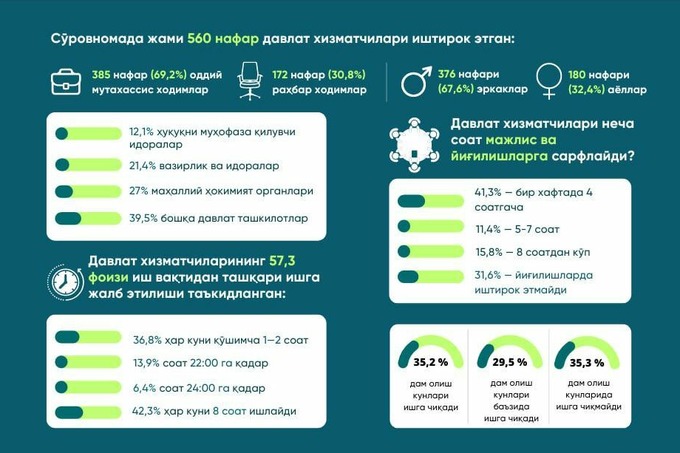Survey: Almost 60% of civil servants are involved in overtime work
An anonymous survey conducted among 560 civil servants of Uzbekistan (including managers) showed that 57.3% of them were engaged in work outside of working hours. 81.7% said that no additional fee was paid for it.

The "Yuksalish" nationwide movement announced the results of an anonymous survey among civil servants on the extent to which working hours are observed at their workplaces.
A total of 560 civil servants participated in the survey, 21.4% of the respondents were employees of ministries and agencies, 27% - local administrations, 12.1% - law enforcement agencies, and 39.5% - employees working in other state organizations.
376 respondents (67.6%) were men and 180 (32.4%) were women. 385 (69.2%) ordinary professional employees and 172 (30.8%) managers took part in the survey.
Learning outcomes
During the study, it became known that more than half of the respondents, that is, 57.3%, are engaged in work outside of working hours. Among them, 36.8% said that they work an extra 1-2 hours every day, 13.9% work until 10:00 p.m., and 6.6% until 12:00 p.m. In the survey, 42.3% of the participants reported that they work 8 hours per day, as stipulated by the Labor Law.
Article 262 of the Labor Code stipulates that an employee should have at least twofold payment for overtime work. It turned out that 13.3% of those who work overtime noted that their employers pay them at least twice as much for overtime. They correspond mainly to the representatives of the central offices of state administration bodies. 81.7% of the participants of the survey who work overtime are not paid by the employer for overtime.
A natural question arises as to what causes public service employees to work overtime. 47.7% of overtime workers stated that their workload has been increased, 22.8% complained about excessive number of various redundant tasks, 17.6% spoke about work out of their duties and prolonged meetings, 12% said that they work until their manager leaves.
Excessive "holding a meeting" is also one of the factors
One of the reasons for overtime work in the public service by the authors of the survey was the fact that there are many meetings, the time of the meetings is prolonged was studied separately. According to it, 31.6% of respondents do not participate in meetings, 41.3% spend up to 4 hours, 11.4% spend 5-7 hours, 15.8% spend more than 8 hours in meetings. According to the research, excessive "holding a meeting" is observed in Bukhara, Kashkadarya and Surkhandarya regions.
State civil service employees in the country mainly work in a 5-day work week. However, there are cases where employees are at work on weekends (Saturday and Sunday), as well as when they are called to work on holidays.
In this regard, it was found that 35.2% of survey participants work on weekends, 29.5% sometimes work, and 35.3% do not work on weekends.
299 (53.4%) of the participants of the survey said that they will go on vacation and have a full rest within the specified period. However, 26.2% of the respondents reported that they could not go on a full vacation, they were recalled from the vacation, and 20.4% reported that the vacation documents were issued, but they worked without rest at all.
According to the movement, although the above figures are not sufficient to fully reflect the situation in the entire country, they confirm that there are cases of non-compliance with the labor legislation in the public service.
"According to the joint study of the World Health Organization and the International Labor Organization, it has been proven that overtime work has negative consequences for human health. In 2016, 745,000 people worldwide who worked more than 55 hours a week died from stroke and ischemic heart disease. This indicator is 29% more than in 2000, and about 72% of such deaths were attributed to men," the analysis says.
According to the results of the study, it was concluded that working 55 hours a week and more increases the risk of stroke by 35% and the risk of ischemic heart disease by 17%.
According to experts, working without rest causes stress in employees. In addition, people who spend a lot of time at work are not able to devote enough time to raising children. As a result, stability in the family is undermined. The societal toll of such factors has yet to be assessed, and the negative impact may be more widespread.
The WHO and the ILO recommend that governments take strict measures to ban overtime work, employers and trade unions provide for flexible working hours in collective agreements, which should not exceed 55 hours per week.
In this regard, in developed countries, overtime work is regulated by a number of laws to protect the health of employees, so that they can continue to work effectively. For example, in Sweden, an employee cannot work overtime for more than 50 hours in a month or 200 hours in a calendar year. In this regard, it can be observed that the workload in Hungary is relatively high. According to national legislation, the maximum overtime limit is 250 hours per year. This can be increased to 300 hours if stipulated in the collective agreement. According to the Labor Code of Uzbekistan, overtime working hours should not exceed 120 hours per year.
Efforts to "return officials to their families"
In the spring of 2017, the President of Uzbekistan, Shavkat Mirziyoyev, declared a "state of emergency" against the increased working regime of the country's leadership. Residents of Tashkent and other cities of the country also reported that the lights in the windows of state institutions did not turn off until midnight.
In August 2018, at a meeting with heads of ministries and agencies, the President said that civil servants should spend Sundays with their families.
"Now on Saturday, work continues until 5:00 p.m., and Sunday is a day off. The President said to pay attention to the families. At the same time, he emphasized that civil servants should effectively and efficiently perform all functional tasks assigned to them during working hours," the interlocutor of Gazeta.uz said.
Shavkat Mirziyoyev gave an order to reduce the number and duration of meetings held in state bodies, as well as to stop unnecessary reports and data collection.
At the same time, PM Abdulla Aripov instructed all levels of state organizations and offices, in particular, local governments, to develop specific labor regulations.
In order to regulate and increase the efficiency of the meetings, a sharp reduction in their number is planned: they will be held according to the schedule - no more than 2-3 times a week, according to the document signed by the head of the government. In addition, an order was given to reduce the time of meetings for republic-wide meetings to 2 hours, for regions, districts and cities to 1-1.5 hours.
In December 2019, the President signed the decision "On measures to further reduce bureaucratic obstacles and introduce modern management principles into the activities of state bodies and organizations". It mentioned banning meetings on weekends and holidays, giving employees unusual duties and other measures.
In February 2020, the government issued an order to state bodies to comply with labor laws and the labor rights of employees. It is forbidden to retain employees after the end of the working day and to recruit them to work on weekends.
In July 2022, the Ministry of Labor announced the development of a document on the protection of the labor rights of civil servants engaged in work outside of working hours. The ministry proposed to connect the time tracking system of state bodies to the server of the labor inspectorate, as well as to apply increased tariffs for electricity during non-working hours.
Despite these measures, civil servants are being called for overtime and there are regular reports from various regions unnecessary meetings.
Related News

19:15 / 07.10.2025
Yuksalish movement calls for easing import rules and simplifying device registration through UzIMEI

17:20 / 20.06.2025
Yuksalish movement criticizes water infrastructure; Uzsuvtaminot defends progress

17:27 / 19.05.2025
Minors could be permitted to work in service and manual jobs under new draft law

18:02 / 18.11.2024



